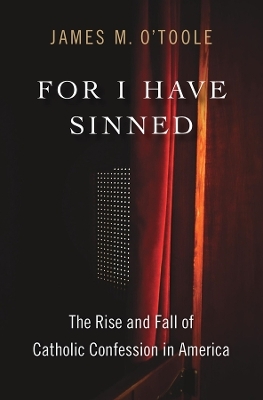
For I Have Sinned
The Rise and Fall of Catholic Confession in America
Seiten
2025
Harvard University Press (Verlag)
978-0-674-29452-3 (ISBN)
Harvard University Press (Verlag)
978-0-674-29452-3 (ISBN)
- Noch nicht erschienen (ca. März 2025)
- Versandkostenfrei
- Auch auf Rechnung
- Artikel merken
The history of US Catholicism is the history of confession. For I Have Sinned charts the rise of confession as the defining ritual of American Catholic piety and identity—and its fall, as clergy sex-abuse scandals and the cultural shifts of the 1970s decimated interest in a practice that, today, is alien even to most faithful believers.
The remarkable story of how confession became a defining rite for American Catholics—and then, beginning in the 1970s, all but disappeared.
For generations, American Catholics went faithfully to confession, admitting their sins to a priest and accepting through him God’s forgiveness. The sacrament served as a distinctive marker of Catholic identity, shaping parishioners’ views of their relationship to God, their neighbors, and the wider world. But starting in the 1970s, many abandoned confession altogether. Focusing on the experiences of both laypeople and priests, James M. O’Toole reconstructs the history of confession’s steady rise—and dramatic fall—among American Catholics.
In the early United States, the Catholic Church grew rapidly—and with it, confession’s centrality. Although the sacrament was practiced unevenly for much of the nineteenth century, frequent confession became common by the early twentieth. Both priests and parishioners understood confession as a ritual crucial for the soul, while on a social level, it established Catholic distinctiveness within a largely Protestant country. Today, however, even faithful Catholics seldom confess. The reasons for this change, O’Toole reveals, include the emergence of psychology and other forms of counseling; the Church’s stance against contraception, which alienated many parishioners; and a growing sense of confession’s inability to confront social problems like structural racism, poverty, and sexism. Meanwhile, increasing recognition of sexual abuse within the Church further undermined trust in clergy as confessors.
Sensitively attuned to the historical importance of confession, For I Have Sinned also suggests that, if the sacrament no longer serves the needs of US Catholics, the Church and its members might find new ways to express their ideals in the twenty-first century.
The remarkable story of how confession became a defining rite for American Catholics—and then, beginning in the 1970s, all but disappeared.
For generations, American Catholics went faithfully to confession, admitting their sins to a priest and accepting through him God’s forgiveness. The sacrament served as a distinctive marker of Catholic identity, shaping parishioners’ views of their relationship to God, their neighbors, and the wider world. But starting in the 1970s, many abandoned confession altogether. Focusing on the experiences of both laypeople and priests, James M. O’Toole reconstructs the history of confession’s steady rise—and dramatic fall—among American Catholics.
In the early United States, the Catholic Church grew rapidly—and with it, confession’s centrality. Although the sacrament was practiced unevenly for much of the nineteenth century, frequent confession became common by the early twentieth. Both priests and parishioners understood confession as a ritual crucial for the soul, while on a social level, it established Catholic distinctiveness within a largely Protestant country. Today, however, even faithful Catholics seldom confess. The reasons for this change, O’Toole reveals, include the emergence of psychology and other forms of counseling; the Church’s stance against contraception, which alienated many parishioners; and a growing sense of confession’s inability to confront social problems like structural racism, poverty, and sexism. Meanwhile, increasing recognition of sexual abuse within the Church further undermined trust in clergy as confessors.
Sensitively attuned to the historical importance of confession, For I Have Sinned also suggests that, if the sacrament no longer serves the needs of US Catholics, the Church and its members might find new ways to express their ideals in the twenty-first century.
James M. O’Toole is Charles I. Clough Millennium Professor of History Emeritus and University Historian at Boston College. He is the author of The Faithful: A History of Catholics in America and the editor of Habits of Devotion: Catholic Religious Practice in Twentieth-Century America.
| Erscheint lt. Verlag | 4.3.2025 |
|---|---|
| Zusatzinfo | 11 photos |
| Verlagsort | Cambridge, Mass |
| Sprache | englisch |
| Maße | 140 x 210 mm |
| Gewicht | 551 g |
| Themenwelt | Geschichte ► Teilgebiete der Geschichte ► Religionsgeschichte |
| Religion / Theologie ► Christentum ► Kirchengeschichte | |
| ISBN-10 | 0-674-29452-1 / 0674294521 |
| ISBN-13 | 978-0-674-29452-3 / 9780674294523 |
| Zustand | Neuware |
| Informationen gemäß Produktsicherheitsverordnung (GPSR) | |
| Haben Sie eine Frage zum Produkt? |
Mehr entdecken
aus dem Bereich
aus dem Bereich
Von den Anfängen bis zur Gegenwart
Buch | Hardcover (2022)
C.H.Beck (Verlag)
CHF 47,60
Herkunft, Blüte, Weg nach Osten
Buch | Hardcover (2024)
C.H.Beck (Verlag)
CHF 55,90


